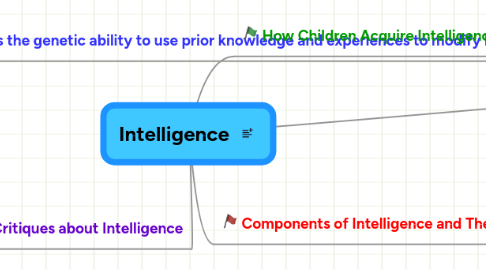Intelligence
por Melissa Dupper


1. Definition: Intelligence is the genetic ability to use prior knowledge and experiences to modify behavior and accomplish new tasks.
2. Questions/Critiques about Intelligence
2.1. Why do educators mainly focus on Gardner's Multiple Intelligences when there are other theories/components to it?
2.2. How do you ensure that you are accurately assessing a child's intelligence?
2.3. The complexcities of IQ tests are fascinating.
2.4. Intelligence is unique to each individual person.
2.5. There are greater ways to assess IQ than by looking at an IQ score alone.
3. How Children Acquire Intelligence
3.1. Heredity plays a role in how children acquire intelligence:
3.1.1. Adoption studies have shown a correlation between IQ scores and biological parents.
3.2. Environment plays a role in how children acquire intelligence:
3.2.1. Stimulating home environments can influence intelligence.
3.3. Gender plays a role in how children acquire intelligence:
3.3.1. This is possibly due to biological differences in the brain.
3.4. Socioeconomic status plays a role in how children acquire intelligence:
3.4.1. This can be a result of; nutrition, parent involvement, amount of parent knowledge and/or skills, educational opportunities and resources.
4. Components of Intelligence and Theorists Perspectives
4.1. Spearman's g: Intelligence may involve a general ability to think and reason.
4.2. Sternberg's Triarchic Theory: Intelligent behavior involves environmental context, prior experiences and cognitive process.
4.3. Gardner's Multiple Intelligences: People have several specific abilities, called multiple intelligences, that are independant of others.
4.3.1. The great majority of children are intelligent in their own way.
